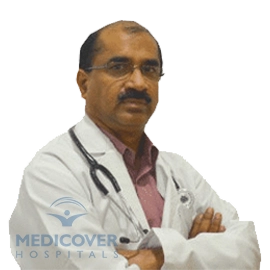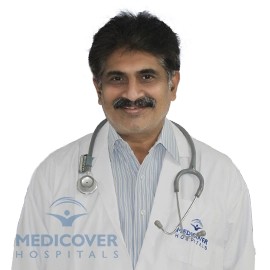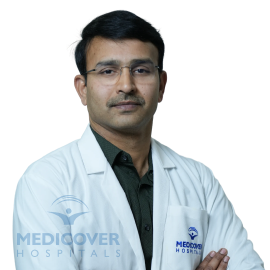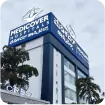What is Gastrectomy Surgery?
Gastrectomy is a major surgical procedure where a part or the entire stomach is removed and the digestive system is reconstructed. This procedure is usually performed to treat Gastrectomy conditions such as stomach cancer, severe ulcers, or other serious gastrointestinal disorders that cannot be managed through non-surgical methods. The surgery helps improve health, relieve symptoms, and prevent further complications.
Types of Gastrectomy Surgery
Here are the main types of gastrectomy surgery procedures:
- Partial Gastrectomy: Removes part of the stomach, usually for treating stomach cancer or other problems.
- Total gastrectomy removes: Removes the entire stomach, typically done for advanced stomach cancer. The esophagus is connected directly to the small intestine.
- Sleeve Gastrectomy: Removes most of the stomach, leaving a small tube. This is often used for weight loss surgery to reduce hunger.
- Gastric Bypass (Roux-en-Y): Creates a small pouch from the stomach and connects it to a part of the small intestine, bypassing the rest of the stomach and intestine to help with weight loss.
- Gastric Banding (Lap-Band): Places a band around the upper part of the stomach to create a small pouch. It can be adjusted to control how much food you eat, and it is used mainly for weight loss.
These surgeries are used for different health conditions, including cancer treatment and weight loss.
2-4 Hours
Surgery Duration
General Anesthesia
Anesthesia Used
3-6 Months
Full Recovery Timeline

When is Gastrectomy Surgery Recommended?
Gastrectomy, the surgical removal of part or all of the stomach, is performed for various medical conditions. The decision to undergo a gastrectomy is based on the patient's medical history, symptoms, diagnostic tests, and overall health.
Some common indications of gastrectomy include:
- Stomach Cancer: Gastrectomy is often performed to treat stomach cancer, especially when the cancer is localized and has not spread to other parts of the body. The extent of the gastrectomy depends on the size and location of the tumor.
- Peptic Ulcers: Severe, uncontrollable peptic ulcers that cause bleeding, perforation, or obstruction might require gastrectomy to remove the affected portion of the stomach.
- Stomach Polyps: Large or precancerous stomach polyps that cannot be removed endoscopically may necessitate gastrectomy.
- Gastrointestinal Stromal Tumors (GISTs): Some types of GISTs, which are tumors that develop in the digestive tract, may require gastrectomy if they are large, aggressive, or causing symptoms.
- Perforation or Rupture: Gastrectomy might be necessary if the stomach is severely perforated or ruptured due to trauma or a medical condition.
- Uncontrolled Bleeding: If the stomach is bleeding uncontrollably due to a gastric ulcer or another condition, surgery might be required to stop the bleeding and remove the source.
- Intractable Symptoms: Severe symptoms such as unmanageable pain, obstruction, vomiting, or significant weight loss that cannot be alleviated with conservative treatments might lead to a gastrectomy.
- Barrett's Esophagus with High-Grade Dysplasia: In rare cases, patients with Barrett's esophagus (a precancerous condition) and high-grade dysplasia might undergo gastrectomy to prevent progression to esophageal cancer.
- Genetic Conditions: Some hereditary conditions, such as hereditary diffuse gastric cancer syndrome, might lead to a high risk of developing stomach cancer, prompting a preventive gastrectomy.
- Bariatric Surgery: Sleeve gastrectomy is a type of gastrectomy that is used as a weight loss surgery for individuals with severe obesity. It involves removing a large portion of the stomach to reduce its capacity.
How to Prepare for a Gastrectomy Procedure?
Gastrectomy is a major surgical procedure that involves a partial or complete removal of the stomach. Preparing for a gastrectomy is important to make sure the surgery and recovery go smoothly. Your healthcare team will guide you through each step:
- Medical Evaluation: Complete necessary tests, including blood work and imaging, to assess health for surgery.
- Nutritional Assessment: Meet with a dietitian for dietary advice before and after surgery.
- Medication Review: Share your medication list to get guidance on which to continue or stop before surgery.
- Fasting: Do not eat or drink anything for several hours before surgery (your doctor will give exact instructions).
- Smoking & Alcohol: Quit smoking and avoid alcohol before surgery to aid healing and recovery.
- Pre-Surgery Counseling: Discuss the type of surgery (partial or total), anesthesia, risks, and expected outcomes with your surgeon.
- Arrange Support: Plan for someone to help you at home after surgery, especially during the first few weeks.
Steps Involved in the Gastrectomy Procedure
During a gastrectomy procedure, the surgeon removes a portion or the entirety of the stomach, depending on the medical condition and the extent of the surgery. The specific gastrectomy surgery steps can vary based on the type of gastrectomy being performed and the patient's individual circumstances.
Here's a general overview of what happens during a gastrectomy procedure:
- Anesthesia: General anesthesia is administered for pain relief.
- Incision: One or more abdominal incisions are made, depending on the type of gastrectomy.
- Access & Visualization: For minimally invasive surgery, a laparoscope is used to guide the procedure.
- Resection: The affected portion of the stomach is removed, or the entire stomach is removed (in total gastrectomy).
- Reconstruction: The digestive tract is reconstructed, connecting the remaining stomach or esophagus to the small intestine.
- Closure: Incisions are closed with sutures or staples.
- Postoperative Care: Patients are monitored for pain and recovery. Hospital stay varies, and recovery instructions are provided for post-op care.
Who Will Perform the Gastrectomy Procedure?
Several medical professionals and specialists are involved in the diagnosis, treatment, and care of patients undergoing a gastrectomy procedure. These experts collaborate to ensure the best possible outcomes for patients.
Here are some of the key healthcare professionals involved in the treatment of gastrectomy:
- Gastroenterologist Surgeons
- Medical Oncologist
- Radiologist
- Pathologist
- Anesthesiologist
- Registered Dietitian/Nutritionist
- Nurse
- Physical Therapist
- Psychologist/Psychiatrist
Recovery After the Gastrectomy Procedure
Recovery after a gastrectomy procedure, which involves the surgical removal of part or all of the stomach, can be a gradual process that requires patience, adherence to medical guidelines, and support from your healthcare team. Here's what you can generally expect during the recovery period:
- Hospital Stay: Recovery time depends on the surgery type and progress, ranging from a few days to a week or more.
- Pain Management: Pain medications will be provided; communicate with your team to manage discomfort.
- Gradual Diet Progression: Start with IV fluids, then progress from clear liquids to soft foods, based on your doctor's advice.
- Tube Feeding (Sometimes Needed): In some cases, a feeding tube may be placed temporarily to ensure proper nutrition.
- Incision Care: Follow instructions to care for your incision and prevent infection.
- Physical Activity: Begin walking as advised to prevent blood clots, but heavy lifting or strenuous activity should be avoided until cleared by the doctor.
- Follow-Up Appointments: Attend scheduled follow-ups to track progress and address concerns.
- Full Recovery: It may take a few weeks to months before you regain strength and adjust to the new way of eating.
Lifestyle Changes After the Gastrectomy Procedure
After gastrectomy procedure, you will need to make long-term adjustments to support digestion and overall health:
- Eat Small, Frequent Meals - Since the stomach size is reduced or removed, eating smaller portions several times a day helps digestion.
- Hydration: Drink water throughout the day, but sip fluids between meals to avoid filling your stomach too quickly.
- Chew Food Thoroughly: Proper chewing makes food easier to digest and reduces discomfort.
- Avoid High-Sugar Foods: These can cause "dumping syndrome," leading to nausea, diarrhea, or weakness.
- Focus on Nutrition: Include protein-rich foods, vitamins, and minerals to maintain strength.
- Vitamin and Mineral Supplements: Your doctor may recommend supplements like Vitamin B12, iron, calcium, and folic acid to prevent deficiencies.
- Avoid Smoking and Alcohol: Quit smoking and limit alcohol, as it can affect digestion.
- Maintain a Healthy Weight: Regular monitoring and a balanced diet help in long-term recovery.
- Regular Medical Follow-Up: Routine check-ups are needed to track healing and manage any complications.
Benefits of Gastrectomy Surgery
Gastrectomy surgery is performed to remove part or all of the stomach when it is affected by disease or damage. This procedure not only addresses the underlying condition but also helps relieve symptoms and improve overall health.
- Removes diseased tissue: Helps treat stomach cancer, ulcers, or severe gastrointestinal problems.
- Relieves symptoms: Reduces pain, bleeding, or obstruction caused by stomach conditions.
- Improves quality of life: Allows patients to eat and digest food better after recovery.
- Can be life-saving: Especially in cases of cancer or uncontrollable bleeding.
Risks and Complications of Gastrectomy Surgery
Like any major surgery, gastrectomy carries potential risks and complications. While many patients recover without serious issues, it's important to be aware of possible problems that can arise during or after the procedure.
- Infection: Risk of infection at the incision site or within the abdomen.
- Bleeding: There is a risk of excessive bleeding during or after surgery.
- Leakage: Rarely, connections (anastomoses) made in the digestive tract may leak.
- Dumping Syndrome: Rapid passage of food into the small intestine may lead to diarrhea, dizziness, and sweating.
- Nutrient Deficiencies: Especially vitamin B12, iron, calcium, and vitamin D deficiencies.
- Weight Loss: Significant weight loss may occur if dietary adjustments are not followed.
- Malabsorption: Reduced stomach size can affect absorption of nutrients, vitamins, and minerals.
- Adjacent Organs: There is a small risk of injury to nearby organs like the pancreas, spleen, or intestines.
- Nerve Damage: May lead to digestive or abdominal discomfort.
- Adhesions: Scar tissue inside the abdomen may cause bowel obstruction in rare cases.
Cost of Gastrectomy Surgery in India
The cost of gastrectomy surgery in India varies based on the type of procedure (partial, total, or sleeve), the hospital, surgeon's expertise, and city. On average, it ranges from Rs. 2,50,000 to Rs. 6,00,000. The package usually covers hospitalization, anesthesia, surgery, and basic post-operative care. Additional expenses may include diagnostic tests, medications, and extended hospital stays. Always consult your hospital for an accurate cost estimate.










































